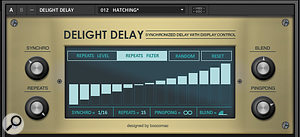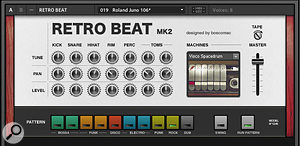Native Instruments' Reaktor isn't a plug-in format as such — more a platform for constructing synths and effects which you can then use in your DAW — but in practice it feels like one. It supports NI's own Minimoog clone Monark, as well as their unusual and complex Skanner XT and Prism synths. There's also a small but significant scene of independent Reaktor users putting out their own 'ensembles', and French developers Boscomac currently offer arguably the most wide-ranging, polished and characterful suite. There are currently 17 instruments and 15 effects available and, as there's not room to go into them all, here's a run-down of my favourites.
 The two included synths couldn't be more different. The Howler dispenses with niceties like waveform selection, LFOs and proper envelope generators, and replaces them with potent pre-filter drive and 'Larsen', which feeds the output back into the filter. Mod and pitch wheels provide real-time control of these and other parameters. It's a little brute of a thing, but very contemporary-sounding. Meanwhile, The Chiller is more or less an ARP Omni clone, generating luscious, juicy, string-like Kraftwerk and Jean-Michel Jarre tones.
The two included synths couldn't be more different. The Howler dispenses with niceties like waveform selection, LFOs and proper envelope generators, and replaces them with potent pre-filter drive and 'Larsen', which feeds the output back into the filter. Mod and pitch wheels provide real-time control of these and other parameters. It's a little brute of a thing, but very contemporary-sounding. Meanwhile, The Chiller is more or less an ARP Omni clone, generating luscious, juicy, string-like Kraftwerk and Jean-Michel Jarre tones.
 One of a trio of deliberately vintage-vibe, naïve drum machines, Retrobeat MkII carries 27 great-sounding, tuneable sample sets from drum machine classics such as the Roland CR78 and TR808 and the Linn Drum, little-known home-organ oddities, and synths including the Sequential Pro One, Formanta Polivoks, Korg MS20 and so on. It has cheesy onboard preset patterns, but can be played via MIDI too.
One of a trio of deliberately vintage-vibe, naïve drum machines, Retrobeat MkII carries 27 great-sounding, tuneable sample sets from drum machine classics such as the Roland CR78 and TR808 and the Linn Drum, little-known home-organ oddities, and synths including the Sequential Pro One, Formanta Polivoks, Korg MS20 and so on. It has cheesy onboard preset patterns, but can be played via MIDI too.
 Then, amongst a clutch of organs and pianos, Tranzistorg is a nice Vox Continental clone, equipped with drawbars, Leslie, cabinet emulation, and a deliciously vintage reverb. Air Piano is superb: a spectrally skewed, reverb-bathed beauty that's a clear homage to Brian Eno's Music For Airports and effortlessly inspiring.
Then, amongst a clutch of organs and pianos, Tranzistorg is a nice Vox Continental clone, equipped with drawbars, Leslie, cabinet emulation, and a deliciously vintage reverb. Air Piano is superb: a spectrally skewed, reverb-bathed beauty that's a clear homage to Brian Eno's Music For Airports and effortlessly inspiring.
 Getting into seriously niche territory, Boxymuse does old wind-up music-box sounds, which would work equally well for a children's TV show or your next horror film soundtrack. The attention to detail here is typical of the collection as a whole. The GUI is a model in how to combine style and character with clarity — the quaint zoetrope-like animation of a dancing couple advances one step with each note message received.
Getting into seriously niche territory, Boxymuse does old wind-up music-box sounds, which would work equally well for a children's TV show or your next horror film soundtrack. The attention to detail here is typical of the collection as a whole. The GUI is a model in how to combine style and character with clarity — the quaint zoetrope-like animation of a dancing couple advances one step with each note message received.
 The remaining two instruments could prove essential for film composers and Jonny Greenwood devotees alike. Vertigo Wave is a MIDI-driven Ondes Martenot, and not only sounds really good, offering four of the same haunting timbres as the real thing, but the clever velocity-coupled glissando behaviour and mod-wheel volume control let you easily play the thing expressively. Theremouth is technically an effect, and requires an incoming monophonic audio signal (such as your voice) to drive it. The result is one of the most convincing and genuinely usable virtual Theremins out there.
The remaining two instruments could prove essential for film composers and Jonny Greenwood devotees alike. Vertigo Wave is a MIDI-driven Ondes Martenot, and not only sounds really good, offering four of the same haunting timbres as the real thing, but the clever velocity-coupled glissando behaviour and mod-wheel volume control let you easily play the thing expressively. Theremouth is technically an effect, and requires an incoming monophonic audio signal (such as your voice) to drive it. The result is one of the most convincing and genuinely usable virtual Theremins out there.
 Turning to the effect processors proper, Delight Delay uses an onboard sequencer to control level and filter characteristics for up to 15 discrete echoes, and lets you set up groove-based and experimental effects with great ease. I can't think of an equivalent in the plug-in world. Echophonic incorporates a modulated delay line with reverb, to create glorious psychedelia. The relatively few, well-chosen parameters on offer somehow provide everything needed to cover vast sonic territory.
Turning to the effect processors proper, Delight Delay uses an onboard sequencer to control level and filter characteristics for up to 15 discrete echoes, and lets you set up groove-based and experimental effects with great ease. I can't think of an equivalent in the plug-in world. Echophonic incorporates a modulated delay line with reverb, to create glorious psychedelia. The relatively few, well-chosen parameters on offer somehow provide everything needed to cover vast sonic territory.
 Granular techniques lie behind the easy-to-use Freezbee and Stellar, which respectively freeze incoming audio into static, cloud-like textures, and add shimmering, pulsating, pitch-shifted stacks and layers. I could go on about the marvellous Floodverb, with its infinite reverb tails and ducked mode, which lets you use those tails without everything ending up a terrible mess. Or the fine tube saturator and dynamics processor Magnitude and all-singing digital degrader Bit Torsion, which make others of their ilk sound anaemic. But I'm running out of space.
Granular techniques lie behind the easy-to-use Freezbee and Stellar, which respectively freeze incoming audio into static, cloud-like textures, and add shimmering, pulsating, pitch-shifted stacks and layers. I could go on about the marvellous Floodverb, with its infinite reverb tails and ducked mode, which lets you use those tails without everything ending up a terrible mess. Or the fine tube saturator and dynamics processor Magnitude and all-singing digital degrader Bit Torsion, which make others of their ilk sound anaemic. But I'm running out of space.
Perhaps most remarkable thing of all is the pricing for these goodies: free, though a donation is requested. Having in the past shelled out upwards of $50 for single plug-ins that are less good than these Reaktor-based alternatives, I'd suggest a good healthy donation is appropriate. Of course, you do need a full version of Reaktor to run them, and automating them is not quite as simple as it is with conventional plug-ins — although MIDI mapping of parameters in Presonus Studio One, which I used for testing, was very easy to achieve — but these are brilliant tools by any standards. Quirky? Yes, very, but all the more inspiring for that. Robin Bigwood
Price: donationware
Price: donationware
